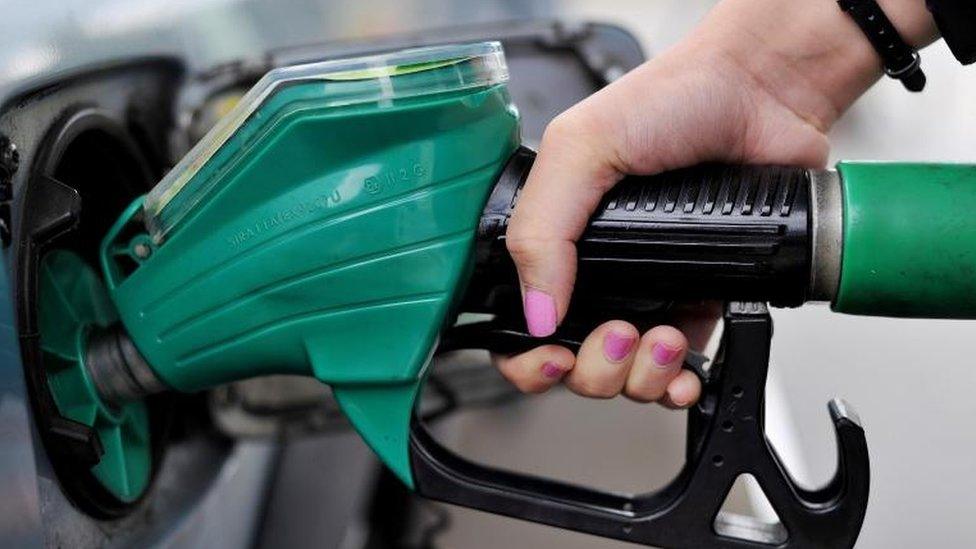Inflation – it isn’t about sterling, yet
- Published
- comments

To a resident of the 1970s the headline "inflation soars to 1%" would seem as baffling as being told that in some distant time in the future people would walk around with telephones in their pockets and photographs of someone called Kim Kardashian would regularly threaten to "break the internet" (whatever that was).
We are certainly in a different world from 40 years ago when inflation flirted not with 1% but 30%.
Control of the "price beast" kept politicians awake at night. Inflation eroded incomes and savings.
Referendum
Since the financial crisis, inflation has more or less disappeared as a political issue, squeezed out of the economy by collapsing growth and de-leveraging as the public and businesses paid off their debts.
Now, inflation is creeping up the political agenda.
And the fall in the value of sterling is only going to exacerbate that trend.
To be clear, today's increase is not "explicitly linked" - to use the Office for National Statistics' own phrase - to the pound's 17% decline since the referendum.
Fuel and clothing prices were at low levels this time last year, and today's inflation figure is a comparison with those numbers.
Rising prices
That is not to say that inflationary pressures are not building.
Input prices, that is the cost of raw materials and labour that goes into making things, rose by 7.2% in the year to September, the third monthly increase.
This is the key quote from the Office for National Statistics: "The recent return to positive producer price inflation can be partly attributed to the changes in the sterling exchange rate.
"All else equal, a depreciation of sterling increases the prices of imports, with a corresponding impact on the prices paid by producers for imports. If these producers raise their prices in turn, then movements in the exchange rate can influence output producer prices."
And that is likely to mean higher prices for consumers in the shops, following the trend already set at the fuel pump.
'Everyone'
The return of higher levels of inflation is likely to be one of the defining issues for Theresa May's government.
The reason for that is simple.
Once the figure for inflation rises above the figure for wage growth - at present running at just over 2% - then incomes start falling in real terms.
That is politically uncomfortable for any government, particularly one that has staked its reputation on making the economy work "for everyone".
As Mark Carney, the Governor of the Bank of England, made clear on Friday, the first to feel the impact of a rise in inflation - at its most basic an increase in the price of essentials like food and fuel - are the "just managing classes" who spend a high proportion of their income on daily staples.
These are people in work but who feel very far from comfortably off.
'Risk shift'
Add to that the benefits freeze announced by the government last year, and the toxicity of even relatively low levels of inflation becomes clear.
Before the freeze, those on working age benefits or tax credits would be shielded to an extent from inflation by an automatic increase in benefits in line with the headline figure.
With that connection broken, real incomes for those on benefits and in work will be more adversely affected.
As the Institute for Fiscal Studies said this morning: "This policy [the benefits freeze] represented a significant takeaway from a large number of working age households.
"But it also represented a shifting of risk from the government to benefit recipients.
"Previously, higher inflation was a risk to the public finances, increasing cash spending on benefits.
"Now the risk is borne by low-income households: unless policy changes, higher inflation will reduce their real incomes."
Not rampant
It is important to remember as UK inflation ticks upward, we still live in a largely deflationary world.
The engine of that deflation is China, where weakening demand and a weakening currency has led to commodity price falls and markets flooded with cheap exports.
Poor growth across Europe is adding to that downward pressure.
Inflation - even in Britain - will not become "rampant". And of course some inflation is good for economic growth, as it encourages investment as businesses are motivated by the prospect of higher prices and higher profit margins.
Yes, an inflation increase is likely to be politically dangerous for Theresa May.
But we are not going back to the 1970s.
- Published18 October 2016
